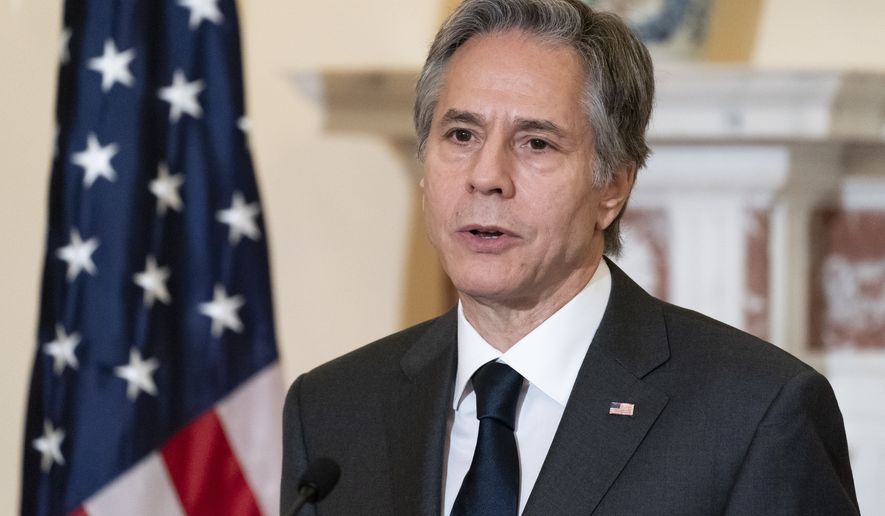Secretary of State Antony Blinken vowed Thursday the United States “will continue to stand up for religious freedom around the world” as the agency released a more than 2,000-page report on the state of religious tolerance in countries around the world.
The “2021 Report on International Religious Freedom” is an annual survey delivered to Congress and covers the state of religious liberty in close to 200 nations around the globe. Country-by-country sections are available online at https://www.state.gov/reports/2021-report-on-international-religious-freedom/.
The report drew some immediate criticism from religious freedom advocates that the Biden administration had pulled its punches on some key countries such as Nigeria for political or diplomatic considerations.
Speaking at a briefing during which he did not take questions, Mr. Blinken — flanked by Rashad Hussein, U.S. Ambassador for International Religious Freedom — praised Morocco, Taiwan, Timor Leste and Iraq for various accommodations granted to minority religions, ranging from the inclusion of Jewish history in Morocco’s school curriculum to the 2021 visit of Pope Francis to Iraq, which he said promoted interfaith cooperation there.
At the same time, he said “in Afghanistan, conditions for religious freedom have deteriorated dramatically under the Taliban, particularly as they crack down on the basic rights of women and girls to get an education to work to engage in society, often under the banner of religion.”
As the Biden administration tries to recalibrate its relationship with Saudi Arabia, the nation’s top diplomat voiced a conditioned approval of what he called the oil-rich kingdom’s “important recent moves to increase interfaith dialogue and religious tolerance.”
But he added that in the kingdom, “publicly practicing any faith other than Islam remains illegal, and the government continues to discriminate against members of religious minority communities.”
Mr. Blinken is due to visit Saudi Arabia later this week, and there is discussion that President Biden may meet with de facto ruler Crown Prince Mohammed bin Salman on a Middle East trip in the coming weeks after a long period of cooled relations between Washington and Riyadh.
The secretary also noted that “China continues its genocide and repression of predominantly Muslim leaders and other religious minority groups,” while the government there “continues to harass adherents of other religions,” a move he said “seems out of line with Chinese Communist Party doctrine.”
Mr. Blinken also called out “several state governments” in Nigeria for “using anti-defamation and blasphemy laws to punish people for expressing their beliefs,” but neither he nor Ambassador Rashad Hussein, the department’s recently confirmed envoy for international religious freedom issues, called for the designation of Nigeria as a so-called “country of particular concern” under U.S. criteria.
Ambassador Sam Brownback, Mr. Hussein‘s predecessor in the post, said “the brutal murder just weeks ago of a young Christian college student shows it was a tragic mistake to remove from Nigeria from the ‘Countries of Particular Concern’ list. … We must reward good behavior, not bad. Nigeria’s removal from the CPC list without first showing true progress only encourages intolerance and violence.”
David Curry, president of advocacy group Open Doors USA and a new appointee to the U.S. Commission on International Religious Freedom, said keeping Nigeria off of the CPC list is “puzzling,” as much of the country’s Muslim-dominated north has become what he called a ” no-go zone for Christians.”
“More people are killed in Nigeria for their faith than almost anywhere in the world,” Mr. Curry said.
A State Department spokesperson told The Washington Times via email, “The U.S. government closely monitors government prosecutions of blasphemy and defamation as well as accusations in social media. We regularly confer with the government of Nigeria about these cases and the dangers of blasphemy accusations.”
Speaking to reporters at the department’s daily press briefing, Mr. Hussein said the department “will release the CPC and special watch list determinations before the end of the year,” but offered no clues as to who would be on the lists. Mr. Hussein, the first Muslim to serve as IRF ambassador, said religious persecution remains widespread around the world.
“From Jehovah’s Witnesses in Russia, Jews in Europe, Bahais in Iran, Christians in North Korea, Nigeria and Saudi Arabia, Muslims in Burma and China, Catholics in Nicaragua, and atheists and humanists around the world, no community has been immune from these abuses.”
Despite the challenges, Mr. Hussein sounded an optimistic note during the briefing: “We remain hopeful about the future. civil society groups and countries all over the world are essential to this report and to our work.”
The ambassador said that “advocacy changes laws, it lifts up the names of prisoners, provides lawyers to fight against spurious charges, and pushes governments including our own, to do the right thing.”
Open Door USA’s Mr. Curry said the State Department can do more to promote religious freedom around the world, “particularly with our international partners such as Nigeria, India and Saudi Arabia, to create freedom for each individual to practice their faith.”
Asked about the juxtaposition of Saudi Arabia’s listing as a “Country of Particular Concern” regarding religious freedom and Mr. Blinken‘s visit there later this week, Mr. Curry said “it is wise” for the diplomat “to sit down and talk with Saudi leaders and try to work towards personal freedom for individuals.”
Ambassador Hussein, at the later press briefing, said he was encouraged during a recent visit to Saudi Arabia to see what he called “unprecedented” participation by Christian, Jewish, Hindu and Sikh leaders at a conference there.
“So we are seeing some positive developments,” he said, “but Saudi Arabia remains a CPC.”
• Mark A. Kellner can be reached at mkellner@washingtontimes.com.




Please read our comment policy before commenting.